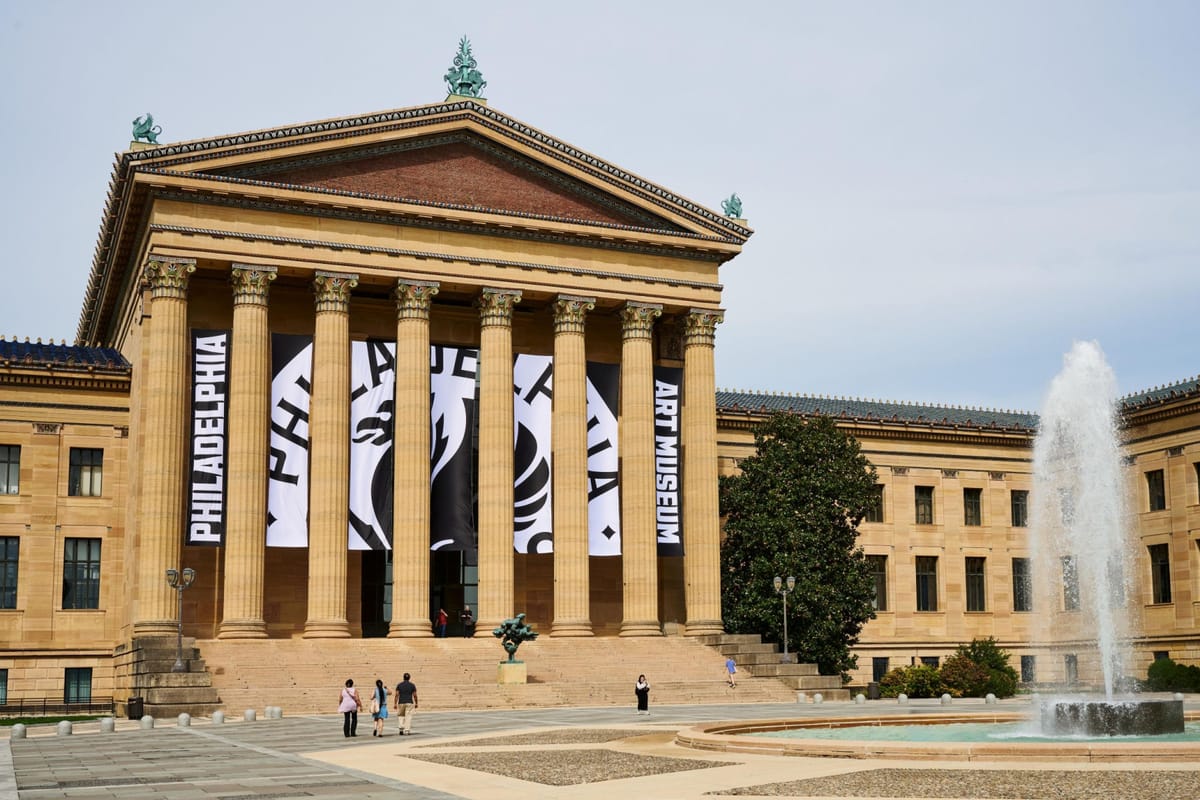
The former director of the Philadelphia Art Museum, who was ousted earlier this month after the institution’s controversial rebrand, has filed a lawsuit claiming she was fired “without a valid basis.”
Sasha Suda’s lawsuit, obtained by Urgent Matter, was filed Monday in the First Judicial District of Pennsylvania and is seeking damages “in an amount to be proven at trial” that would likely include two years of severance pay as promised in her contract, lost benefits, harm to reputation, and other financial losses caused by her alleged wrongful termination.
She accuses the museum of breach of contract and seeks both financial and injunctive relief, asking the court to order the museum to abide by a mutual non-disparagement clause in her employment agreement and to issue a mutual release preventing further reputational harm, a legal device to prevent lingering or future civil claims from either party.
“This case is about a visionary leader who was recruited to transform a struggling museum, but was later terminated when her efforts to modernize the museum clashed with a small, corrupt, and unethical faction of the board intent on preserving the status quo,” it reads.
Last month, under Suda’s direction, the Philadelphia Museum of Art announced it would rebrand as the Philadelphia Art Museum with new custom typography and the redrawing of an image of a griffin in its logo. It also launched a website overhaul.
But the Philadelphia Inquirer soon reported that the rebrand surprised locals and board members with critics calling the design “more like a soccer team, a clothing brand for teens or a beer label than an art museum.” It was also reported that some trustees claimed they “never approved” the final rollout of the rebrand.
The complaint references communication with the museum’s audit committee chair over governance and conduct concerns.
When Urgent Matter asked the Philadelphia Art Museum for information about her firing when news of it broke last week, the institution confirmed by email that Suda was no longer with the museum but said it was “an internal matter” and that it was limited in what it could say. It did not respond to questions on why the museum was limited in its comments.
In her 30-page complaint, Suda noted that the museum was suffering from “scandals involving sexual harassment and employee mistreatment” when she was recruited to lead the institution because of her “reputation for modernization and revitalization” in previous roles.
But she alleged that once she got to the museum she was met with “entrenched resistance” to every decision she made and described a culture of “drama, infighting and dysfunction.”
“Members of the board interfered in staffing, programming, exhibition planning, and even the smallest details of administration,” she alleged. “A former board chair insisted that her gardener’s sister be hired in an educator role, and she confronted a staff member using profanity when someone else was selected after going through the proper hiring process. In this culture of micromanagement and mistrust, Suda pushed forward, nonetheless.”
Suda’s filing describes a pattern of board interference stretching from union negotiations to exhibition planning and claims trustees verbally abused staff at public events without consequence.
Her lawsuit accuses a faction of the board that had formed an executive committee of manufacturing pretextual grounds for her dismissal by hiring a law firm to conduct a “sham investigation” before her dismissal amid attempts to falsely accuse her of using museum funds for personal gain.
According to the complaint, the “forensic investigation” focused on her approved travel expenses and cost-of-living pay increases and was used to justify firing her “for cause” despite the museum’s prior authorization of those payments. She alleges the process was designed to tarnish her reputation rather than address legitimate financial issues.
The legal basis for the lawsuit is rooted in her contract and her negotiations for severance upon her departure from the museum.
She said the museum allegedly refused to provide her with reciprocal release, wanting her to release all legal claims against the museum but not releasing any claims it might have against her. She alleged the museum also wanted her to sign a non-disparagement and confidentiality clause binding only her, not the museum.
By denying the reciprocal release, she says the museum breached Section 5.6 of her contract—making the severance offer “one-sided and unlawful.”
The lawsuit says her 2022 employment contract guaranteed two years of severance pay if she was let go without cause, which it defined as serious misconduct such as dishonesty, criminal behavior, or refusing to do her job after being warned.
The filing further claims the museum delayed her severance start date and declined to pay her immigration counsel, actions Suda says jeopardized her ability to remain in the United States after her termination.
“The museum breached Suda’s agreement and engaged in a malicious campaign of retaliation, disparagement, and humiliation,” the complaint said. “Suda seeks to hold the Museum accountable for its bad faith, its unlawful termination, and its deliberate effort to destroy her career and reputation.”
Follow along with other lawsuits at Urgent Matter's art lawsuit tracker.
